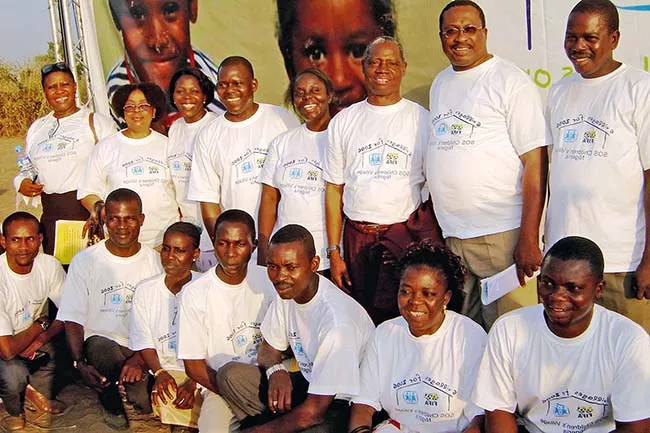Focusing on mental health to better support vulnerable families in Nigeria
In Nigeria, SOS Children’s Villages has begun integrating a community mental health care model into its SOS family strengthening program. It has been less than a year since the model, which uses Problem Management + interventions, became part of SOS Children’s Villages community programing, but positive impact can already be seen within the communities.
Problem Management + (PM+) is a mental health intervention targeting people who are affected by any form of adversity and are experiencing some level of distress. The intervention is particularly effective for populations who have experienced conflict, war and displacement, including separation from their families, and face high levels of stress and trauma. Certified trainers train helpers in the community to use PM+. Since June 2021, 25 members of SOS Children’s Villages staff working in vulnerable communities in Nigeria have been trained to become PM+ helpers.
“For vulnerable families within our family strengthening programs, the PM+ interventions ensure psychological issues do not deteriorate into full-scale mental health issues, which can lead to the caregiver’s inability to provide adequate care and protection for the children as well as to child-family separation,” says Oluwole Amosu, Program Development Advisor at SOS Children’s Villages in Nigeria.

PM+ develops over five weekly sessions, supporting people through evidence-based techniques such as problem solving, stress management and accessing social support. The trained helpers guide program participants through the sessions to so that they find out for themselves what the source of their emotional and practical issues is.
According to Amosu, “PM+ empowers clients to identify their problems and solutions. We guide them to identify what options they have. This way, they come up with solutions within their circle of influence and control. We enable them to get out of their problems themselves and to take the lead to create change.”
Stigma, shame and cultural beliefs that attribute mental health issues to spiritual causes remain a major barrier to addressing mental health issues in Nigeria. This community model, which does not require families to seek the help of a psychologist, are key to ensure families receive the mental health support they need while reducing the risk of stigma.
Nandi Dakum, Gender Program Development Advisor for SOS Children’s Villages in Nigeria, observes that this community model also removes many barriers to accessing mental health services currently faced by community members, especially women, such as cost, distance to service, and language.

“The trained helpers provide the non-specialized service in the communities where they work at no cost. This is a huge step for us to make the intervention accessible to all, especially vulnerable families that do not have access to mental health professionals. We use it widely in our SOS family strengthening programs and extend it to other people in the community who are not part of our programs,” says Dakum.
